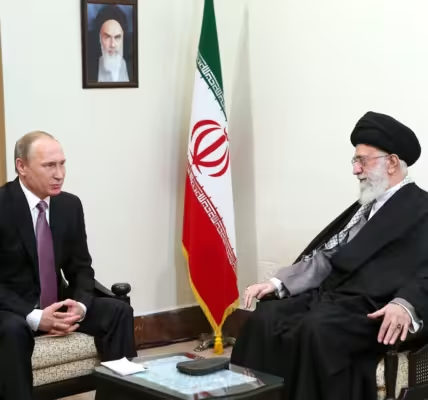Israel urges the west to impose more sanctions on Iran as stock markets plunge in response to the crisis.

Israel has urged the west to imposed a new raft of sanctions on Iran in response to last weekend’s unprecedented drone and missile attack.
Foreign minister Israel Katz said on Tuesday morning that, “alongside the military response” Israel was considering, he had contacted dozens of countries as part of a “diplomatic offensive against Iran”.
He said he had asked them to support sanctions on Iran’s missile programme and declare the country’s Revolutionary Guards a terrorist organisation. “Iran must be stopped now — before it is too late,” Katz wrote on X.
An Israeli government official added that the country was determined to respond to the Iranian attack on its territory, which included more than 300 missiles and drones.
But the official added that the five-person war cabinet — which previously met on Sunday and Monday — was taking into account US concerns that any action should “not be over the top”.
Iran has threatened to hit back at Israel again if the Jewish state retaliates. President Ebrahim Raisi told the Emir of Qatar in a phone call on Monday night that Tehran’s response to “the smallest move against its interests will be fierce, massive and painful”, state media reported.
The threat of a wider Middle East war caused the FTSE 100 to plunge by 1.5pc after top Israeli military officials said their country had no choice but to respond to Tehran’s attack.
The FTSE 250 has fallen as much as 1.6pc, while the Dax in Germany has fallen 1.5pc and Cac 40 in France has dropped as much as 1.8pc amid fears the rising tensions in the Middle East could disrupt global supply chains.
Brent crude oil climbed back above $90 a barrel after it hit a six week high last week and despite Foreign Secretary Lord Cameron and US President Joe Biden urging restraint from Israel. It has since dropped back below £90.
Meanwhile, the UK’s former defence secretary Ben Wallace said the West needs to “wake up” to the threat posed by Iran
Mr Wallace said Iran’s behaviour in the region had dashed his own hopes that reformers “would one day triumph over the hardliners”.
Writing in the Daily Telegraph, who served as an Army officer before becoming a politician added: “I have learnt, working against Britain’s adversaries, that the only way to deal with a bully is to retaliate”.
Mr Wallace, who was defence secretary from 2019 to 2023, said Britain had treated Iran cautiously “like a child having a tantrum in a restaurant”.
He continued: “We have tolerated the proxies and the malign influence. And many of us, including me, hoped that the ‘reformers’ would one day triumph over the hardliners.
“But the charge sheet of Iranian aggression is growing. They have armed, trained and directed Hamas, the Houthis and Hezbollah. They have hosted Al Qaeda leaders, seized ships and taken hostages.
“To date, we have done almost nothing in response. In Iran’s eyes we are weak, and we need to wake up.”
A former head of Britain’s foreign intelligence service, MI6, said the Israelis “know that they have to manage their US relationship”, with the White House signalling it wants to see restraint.
“The Americans played an absolutely crucial role in helping Israel defend itself. [Israeli Prime Minister Benjamin] Netanyahu has to manage that dimension,” Sir John Sawers told BBC Radio 4’s Today programme on Tuesday
Mr Wallace likewise suggested Britain could make demands “now that RAF pilots have quite rightly gone to the defence of Israel”.
He proposed Prime Minister Rishi Sunak could push Mr Netanyahu to “decide it is time to help Ukraine in its hour of need and we can see off both Russia and Iranian aggression”.
Mr Sunak promised his former colleague he would be “taking up his points with all our allies in urging them to do more to support Ukraine”.
Amid renewed calls to ban Iran’s Islamic Revolutionary Guard Corps, he said security services “have the powers they need” to disrupt state-backed terrorism.
Sir John said he had not heard “professionals” such as the head of domestic intelligence agency MI5 say they needed the IRGC banned.
“I think it’s more of a rhetorical position of people in various parts of the political spectrum looking for something to do, without really thinking through the substance of it,” he said.
Laura Farris, a Home Office minister, suggested Foreign Secretary Lord Cameron wanted to maintain the ability to speak directly to Iran, something which could be jeopardised if the IRGC was banned.
The leadership is keen to preserve diplomatic ties with Tehran to minimise the risk of a miscalculation in the Middle East which could ignite a wider war.
“Nobody is denying that they are a malign force,” she said. “We have repeatedly sanctioned both individual commanders and the IRGC more generally, so that puts very severe restrictions on their ability to move and on other freedoms that they would have had.
“We are not suggesting they are not a problem.”




























































































































































































































































































